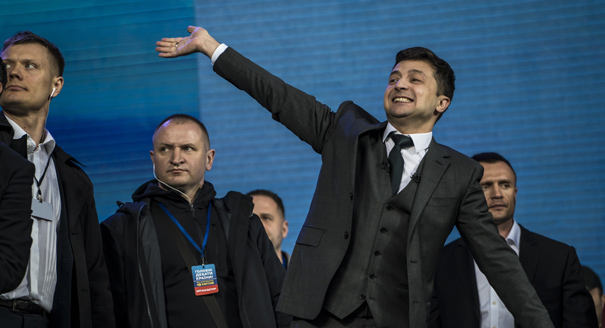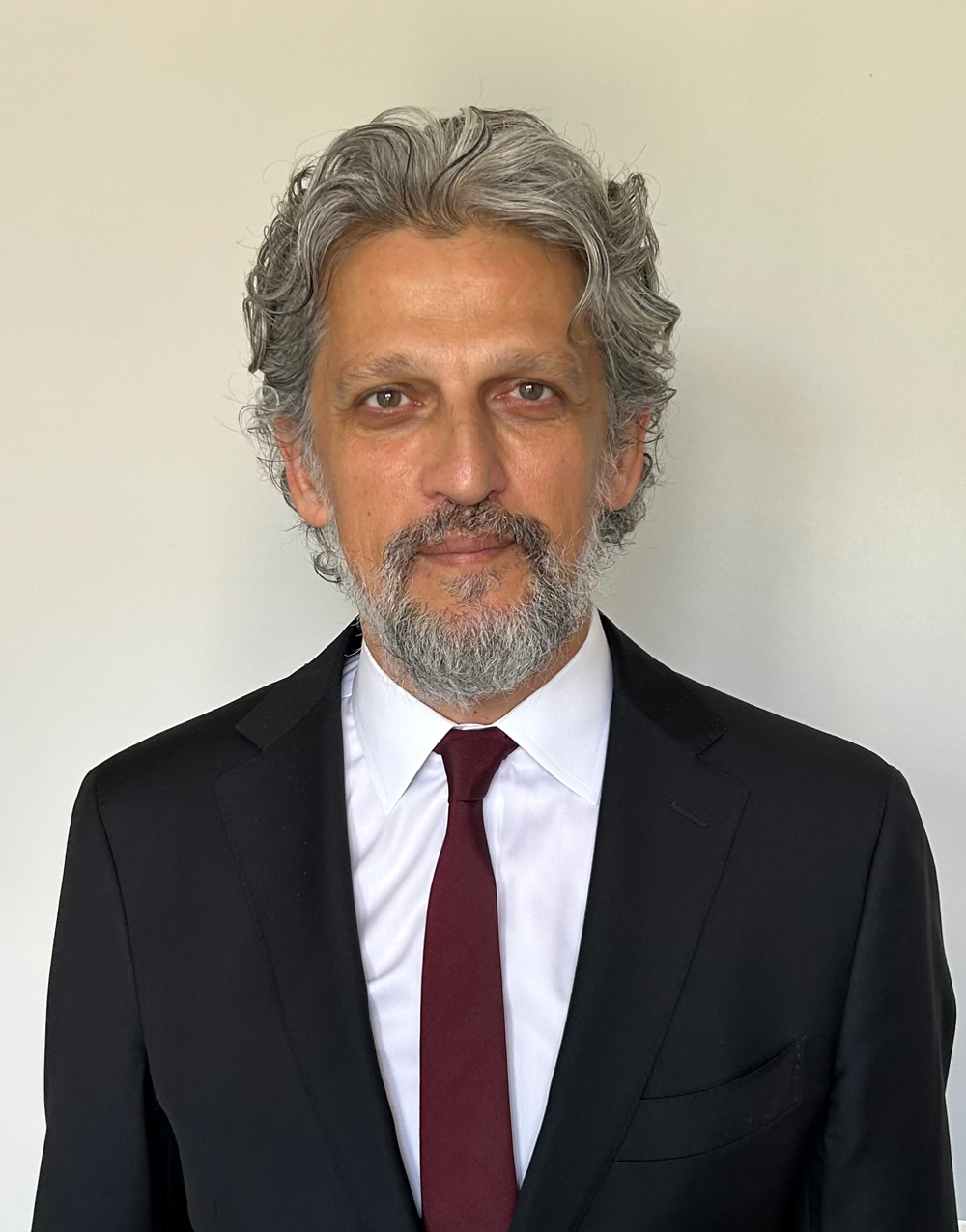Washington and New Delhi should be proud of their putative deal. But international politics isn’t the domain of unicorns and leprechauns, and collateral damage can’t simply be wished away.
Evan A. Feigenbaum
{
"authors": [
"Konstantin Skorkin"
],
"type": "commentary",
"centerAffiliationAll": "",
"centers": [
"Carnegie Endowment for International Peace",
"Carnegie Russia Eurasia Center"
],
"collections": [],
"englishNewsletterAll": "",
"nonEnglishNewsletterAll": "",
"primaryCenter": "Carnegie Russia Eurasia Center",
"programAffiliation": "",
"programs": [],
"projects": [],
"regions": [],
"topics": [
"Economy"
]
}
Source: Getty
Ukraine’s president-elect Volodymyr Zelensky has formulated his ideal country as one that is neither a “corrupt partner of the West,” nor “Russia’s little sister.” This pragmatic kind of civil patriotism is close to the hearts of most Ukrainians, for whom the most important task right now is to fix the country’s domestic problems following the crusade-like presidency of Petro Poroshenko.
Volodymyr Zelensky’s victory in Ukraine’s presidential elections was expected, but sensational nonetheless. His result of 73 percent in the runoff is a record for the country, and it’s all the more amazing considering Zelensky is a political debutant with no past experience, team or clear ideology. The Ukrainian dream of a people’s president has found personification in a comic actor who rose to fame — in a twist stranger than fiction — playing a schoolteacher who accidentally becomes president.
Zelensky’s astounding result is not so much his personal victory as an expression of distrust in all of the old elite, represented by incumbent President Petro Poroshenko. With his brand of new populism, focusing on the country’s domestic problems and the needs of the voiceless majority, Zelensky managed to overcome Ukraine’s electoral divide. Even in western Ukraine, where support for Poroshenko was strongest, the sitting president only managed to beat Zelensky in the Lviv region. Zelensky got the strongest support in the south and east of the country: his native Dnipropetrovsk region, along with the Luhansk, Donetsk, Zaporizhia, Odessa and Kharkiv regions, i.e., the Russian-speaking parts of Ukraine.
The elections also demonstrated the bankruptcy of the national intelligentsia, whose representatives uniformly backed Poroshenko, but were unable to get the ordinary people on their side.
While Zelensky celebrates his victory, it’s worth taking time to think about what support of 73 percent means in practice. On the one hand, it’s carte blanche to carry out radical reforms and purge the state apparatus of the old elites. On the other hand, how can that result be transformed into real policy in a parliamentary-presidential republic with manifold political forces at work and limited presidential powers? Particularly in a post-Soviet republic like Ukraine, with a highly developed deep state: a system of shady clans and clients who play the role of real checks and balances amid a weak judicial system and public policy. Might this not turn out to be a Pyrrhic victory?
In the TV series “Servant of the People,” Zelensky plays a people’s president besieged on all sides by oligarchs and a corrupt system. He only manages to triumph amid this quagmire by pulling off feats that would be impossible in real life. Incidentally, as a comic actor, Zelensky is used to finding himself in a state of constant improvisation, which may serve him well in his new job.
Now the president-elect faces the pressing question of his staff: the team he presented before the elections was more a statement of intent, an attempt to show his willingness to renew. Zelensky has long kept quiet on key appointments to prevent Poroshenko from snatching his people from under his nose (this was no imaginary danger: the popular Colonel Sergei Krivonos, with whom Zelensky’s headquarters were in talks, was swiftly appointed by Poroshenko to Ukraine’s national security council). But now Zelensky must present a real team of people with whom he is going to work.
Zelensky has inherited a government led by Prime Minister Volodymyr Groysman in which he has a strong ally: Interior Minister Arsen Avakov. But in order to appoint his own siloviki — essential to crush any attempts at sabotage by the old elite, and to reassure the army, which is alarmed by the contradictory figure of its new commander-in-chief — Zelensky needs the support of the Verkhovna Rada, the Ukrainian parliament. The current majority was established under Poroshenko, and undoubtedly, after his departure, many deputies will choose to go over to the side of the victor, but Zelensky does not have his own faction, so he will need to make a deal.
Reforming the existing coalition to work under the new president is a task that could be overseen by former Prime Minister Yulia Tymoshenko’s Fatherland party, and the part of the People’s Front party connected to Avakov. But they will demand major concessions in exchange for their help. After all, Tymoshenko, who was knocked out in the first round of the presidential elections, dreams of parliamentary revenge and of reclaiming the post of prime minister.
Another option is to dissolve the Rada by calling early parliamentary elections. This plan may appeal to Zelensky, as it would pull the rug out from underneath his opponents before they have had chance to recover from his triumph, and enable him to try to forge his own majority (his party, also named Servant of the People, is leading the polls and can count on getting a third of the vote), in order to be in a strong negotiating position before the autumn, when the first signs of inevitable disappointment are bound to appear.
Zelensky will also have to promptly tackle the problem of his relationship with the oligarch Ihor Kolomoisky, who owns the TV channel that broadcasts “Servant of the People,” and who is suspected of orchestrating and funding Zelensky’s campaign. Kolomoisky is bent on revenge against his political foe Poroshenko, and would also like a say in running the country. His depiction as Kolomoisky’s puppet caused Zelensky a lot of trouble, but ultimately wasn’t reflected in his electoral results. Admittedly, the oligarch has so far wisely refrained from pulling the strings.
Ukrainian journalists recently reported that numerous representatives of the old elite had made pilgrimages to Kolomoisky’s Israeli office, the implication being that he is the new behind-the-scenes leader. That situation is hardly likely to suit the new president, and Zelensky may well be tempted to put the ambitious Kolomoisky in his place once and for all. But it’s also possible that this will all end in the return of the Dnipropetrovsk clan to power (Kolomoisky was previously that region’s governor).
Zelensky will also have to do something about Ukraine’s war-torn Donbass region, on which he made many contradictory promises during his election campaign. Moscow, which backs separatists in the region, is ready with both stick and carrot: with one hand, the Kremlin is demonstrating cautious benevolence toward the new president, while with the other banning the export of oil products to Ukraine and threatening to issue Russian passports to residents of the breakaway Donbass regions of Donetsk and Luhansk. The Kremlin must also decide what to do about the problem of the bad example set by Zelensky in vilifying the old elites, establishing a dangerous precedent for other former Soviet countries in doing so.
The West, meanwhile, currently views Zelensky with suspicion, which will complicate his plans to expand talks on the peace process in Ukraine and relaunch the Minsk peace agreement, in which European countries played a crucial role. Ukrainian society is tired of the war, but is clearly not prepared to make drastic concessions. In addition, watching vigilantly for the slightest sign of any betrayal to the cause will be the defeated party of war led by Poroshenko.
When presenting his team, Zelensky formulated his ideal Ukraine as a country that is neither a “corrupt partner of the West,” nor “Russia’s little sister.” This pragmatic kind of civil patriotism is close to the hearts of most Ukrainians, for whom the most important task right now is to fix the country’s domestic problems following Poroshenko’s crusade-like presidency.
Whether consciously or intuitively, Zelensky deftly harnessed the huge demand for the normalization of Ukraine, and a midway path between East and West, and between Russian and Ukrainian culture. In ruling the country, he will have to keep listening to that tuning fork, as well as closely monitoring feedback, since the people’s love is his main asset: his strength and also his weakness. Fortunately for Zelensky, as a showman, he is used to working for ratings.
Carnegie does not take institutional positions on public policy issues; the views represented herein are those of the author(s) and do not necessarily reflect the views of Carnegie, its staff, or its trustees.
Washington and New Delhi should be proud of their putative deal. But international politics isn’t the domain of unicorns and leprechauns, and collateral damage can’t simply be wished away.

Evan A. Feigenbaum
Senior climate, finance, and mobility experts discuss how the Fund for Responding to Loss and Damage could unlock financing for climate mobility.

Alejandro Martin Rodriguez
The EU lacks leadership and strategic planning in the South Caucasus, while the United States is leading the charge. To secure its geopolitical interests, Brussels must invest in new connectivity for the region.

Zaur Shiriyev
An Armenia-Azerbaijan settlement may be the only realistic test case for making glossy promises a reality.

Garo Paylan
Venezuelans deserve to participate in collective decisionmaking and determine their own futures.

Jennifer McCoy